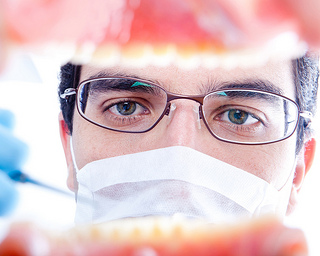March 28th, 2018

The choice to get dentures is a permanent decision so there are several important factors you should take into consideration. Many people have teeth that are not able to be repaired due to a variety of reasons, but for those who have the option and the money to repair their natural teeth they need to consider every choice they may have.
You have a choice!
Yes, it’s true! We do have a choice about whether we will have to have dentures in the future. Many people don’t realize that just by taking certain precautions they can actually prevent any serious issues from arising. For example, it’s very easy to reschedule that dental cleaning. However, it’s very important that you keep every appointment because Dr. Gregory Weaver will be able to catch small problems before you even realize you have them. Also, if there are any signs of gum disease you will know early enough to stop any further damage. One of the main reasons that many people end up needing dentures is because of either gum disease or because severe cavities have cause too many teeth to be extracted.
If you notice any of the following you should make an appointment at our Raleigh, NC office right away:
- Teeth are moving further apart
- Soreness or tenderness of the gums
- Trouble eating hard food
- Sensitivity
- You have already lost several teeth
- Toothaches
The key to avoiding dentures is prevention. Avoiding dentures is not impossible and can be as simple as staying on top of your oral hygiene. However, if you are currently experiencing any dental issues you should see Dr. Gregory Weaver now, because a small problem can quickly escalate into a very large and expensive dental procedure.
March 21st, 2018

Do you have a space where a tooth used to be? Were you born with a missing tooth? Are you getting ready for dentures? You may be a good candidate for a dental implant. Metal dental implants were invented in 1965. Technology continues to advance with millions of implants placed in the United States and Canada. Placing implants has become mainstream and a common practice for offices like ours.
A dental implant is a small titanium post, which resembles a screw with threads. The post also has holes for bone to integrate. A dental implant is placed into the jawbone during a short dental procedure. It is relatively painless with very little post-operative pain. The threads on the implant post allow for the bone to fill in and integrate. To facilitate this process the implant is re-covered with gum tissue and allowed to heal and integrate for nearly three months. The implant acts as the root for the tooth to provide solid and stable support for the crown that’s yet to be placed.
The next step in the dental procedure is to uncover the implant and place a healing cap to allow the gum tissue to heal. After a short period of healing, an impression is taken to fabricate a crown to fully restore the missing tooth. The crown is then cemented on top of the post, at which point you can resume normal eating activities.
Dental implants do require some special care, but that is easily managed when you follow the directions outlined by Dr. Gregory Weaver. During your regularly scheduled cleaning, special instruments are used to clean implants. While a dental implant cannot get a cavity, a condition known as peri-implantitis can occur. This is very similar to periodontal disease as the end result is dental implant loss and loss of bone structure. Be sure to floss the dental implant daily and run the floss under the implant crown as far as it can go to remove food and plaque. If you use any picks or small brushes to go in between your teeth, make sure they are plastic. Metal will scratch the implant making it more susceptible to infection. Be sure to keep your regular dental visits and cleanings to monitor the implant and help preserve your investment.
March 14th, 2018

At Weaver Dentistry, we are well-aware of the 25 million Americans who fear having to visit the dentist. Dental phobias are known to range anywhere from feeling mildly nervous to experiencing sweaty palms and even a racing heartbeat upon entering a dentist’s office. This anxiety can sometimes be so severe that it prevents people from visiting a dentist for years, postponing dental procedures that often result in costly problems down the road.
For those of our patients who have dental anxiety or dental phobia, it may be time to look into sedation dentistry, a safe and effective option for patients who are anxious or afraid, have a bad gag reflex, limited jaw opening, or for those who have a difficult time getting numb.
Sedation dentistry, a term that we use to refer to the use of anesthesia during treatment to put patients into a relaxed state, comes in many forms of sedation, from simply easing anxiety, to “conscious sedation,” which places patients in what we call a “twilight sleep.” Sedation dentistry at our Raleigh, NC office allows our patients to drift through their appointments—including complex dental work—as well as feel completely relaxed throughout their visits, without any discomfort or pain. Sedation dentistry can turn a nerve-wracking visit into a comfortable and enjoyable one.
Dr. Gregory Weaver and our team will be more than happy to discuss any concerns, issues, or fears you may have before or during your visit, and will be able to tell you if you are a candidate for sedation dentistry.
By talking with Dr. Gregory Weaver about sedation dentistry, you can feel more comfortable and relaxed during your next visit to Weaver Dentistry. Give us a call today!
March 7th, 2018

A smile makeover is usually a combination of one or more cosmetic dental procedures. To achieve your desired result, Dr. Gregory Weaver may perform or suggest a variety of options. The entire process is designed specifically for your unique cosmetic needs, and Dr. Gregory Weaver will make sure all your concerns regarding your smile are addressed.
Here are some of the most common procedures in cosmetic dentistry and how they work:
- Tooth whitening – Whiter teeth are achieved through a bleaching process typically using hydrogen peroxide or carbamide peroxide. Yellower teeth usually respond well to this procedure, while brown-colored teeth stained by fluorosis or taking tetracycline do not respond as well to whitening. Tooth whitening is not for everyone; if you have sensitive teeth, gum disease, or poor enamel, Dr. Gregory Weaver may recommend against tooth-whitening services.
- Orthodontics – Braces are one of the tried-and-true ways of achieving a healthier smile. Braces are typically worn between 12 and 24 months to reposition the teeth in a straighter and safer alignment. Since your bite is also corrected during this process, it helps ensure you won't have any trouble down the line. There are several different types of braces available these days including: traditional metal braces, clear ceramic braces, lingual braces, and clear aligners.
- Veneers – Veneers are thin, tooth-colored material (porcelain or resin) designed to be placed on the front surface of teeth to improve their overall appearance. They can be used in cases where the color, shape, size, or length is not as desired. Veneers are usually used in cases where teeth are discolored, chipped, worn down, misaligned, irregular, or have gaps.
- Implants/bridges – Dental implants and bridges are used to replace missing or broken teeth. Nowadays, both implants and bridges are commonly performed procedures. Implants integrate directly with the jawbone, while bridges are placed over the adjacent teeth to the missing tooth. Implant technology has advanced a great deal in recent years and highly biocompatible ceramic materials are becoming more commonplace.
Getting your perfect smile will take time and patience, but the end result will be well worth it! Please schedule an appointment at our Raleigh, NC office about the cosmetic dental services we offer, and achieve the smile you've always wanted!




